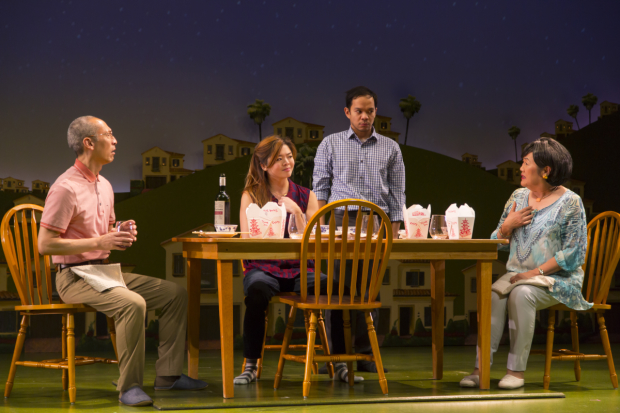Tiger Style!

(© T. Charles Erickson)
Albert and Jennifer have not found happiness in their lives nor are they having fun. They are California-born children of Chinese immigrants who worked hard and made it (their parents are now doctors, the pinnacle of the longed-for version of the American dream). These millennials are angry at mom and dad because there's been no payoff for childhoods spent slaving for top grades, and killer hours spent practicing on their instruments. Despite having Harvard degrees, Jennifer, an oncologist, and Albert, an aspiring software programmer, have hit walls that keep them from their personal goals.
It seems that playwright Mike Lew is holding a mirror up to his own nature in his smart comedy, Tiger Style!, now being presented by the Huntington Theatre Company. The play had its world premiere at Atlanta's Alliance Theatre in 2015, with the same director (Moritz von Stuelpnagel) and four of the five actors featured in this production.
Lew is a Yale graduate whose parents are also doctors, but they have claimed the resemblances end there. However, his play touches on the down side of "tiger parenting" and the prevalence of racial profiling in our society. Albert (Jon Norman Schneider) has been passed over for a raise, in favor of "Russ the Bus" (Bryan T. Donovan), a laid-back, white dude with few smarts. Rather than aggressively seeking the promotion he deserves, Albert "sucks it up," Asian-cliché style, resulting in an ulcer.
Jennifer (Ruibo Qian) has just been dumped for being "kind of exhausting" by her longtime live-in love, Reggie, a slacker who installs car radios and stays rent-free on her dime. When the brother-sister team attack their parents (Francis Jue and Emily Kuroda) over Chinese food, brought home in the familiar cardboard cartons, they are dismissed. "Who has time for all this weepy-weepy?" Mom asks. "You want an apology? Try prying one out of my cold throat," says Dad.
Their reactions force Albert to become assertive with his demands at work, only to be fired. Jennifer tries therapy until she realizes she is more qualified than the shrink (Kuroda plays the doctor in the most amusing scene of the show). When these confrontations fail, they decide to embark for China on an "Asian Freedom" tour.
The second act shifts to a political fantasia on China where the stereotype is flipped and this time they are the clueless Americans, ill-equipped to fight the party rep (Jue again) who is stalking them. They encounter more unbelievable complications on their tour until they finally escape back to the United States where they must deal with a hostile immigration agent (Donovan as another boorish American). The play's tacked-on ending fails to either solve their shared dilemma or point to a future acceptance of life in the real 21st-century world.
The five actors form an effective ensemble, picking up cues to nail the one-liners, as if they were fast-firing cogs on an assembly line. The audience responds in kind to deliver the laughs, but it is questionable if the dark side comes through. Schneider is particularly good at finally expressing his frustrations and wildly looking for resolutions; Qian is adorable as the brilliant woman who is emotionally clueless about her self-inflicted barriers. Jue plays the roles of Dad, the nosey Tzi Chuan who quizzes Albert in Act 1, and the take-charge government secret agent as if he were a full-court press of stand-up comedians. Kuroda delineates each successive role culminating in their frantic Auntie encountered in China, while Donovan is endearingly annoying as both Russ the Bus and Reggie.
The play unfolds against scenic designer Wilson Chin's dual settings in California and China, backed by Alex Koch's glowing bursts of pop-art projections, which further add to the sense of surrealism. Surely, there are issues around Asian-American identity, but Tiger Style! disguises them under a fast-throttle supply of gags and a circular odyssey that leads the whiny siblings back home where their problems began.











